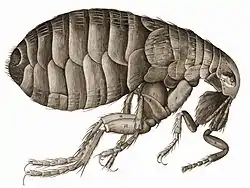のみ
Japanese
Etymology 1
| Alternative spelling |
|---|
| 而已 (archaic) |
⟨no2mi1⟩ → */nəmʲi/ → /nomi/
From Old Japanese.
(This etymology is missing or incomplete. Please add to it, or discuss it at the Etymology scriptorium.)
Derived terms
Derived terms
- のみか (nomi ka)
- のみならず (nomi narazu)
- 音にのみ (oto ni nomi)
- 斯のみ (kakunomi)
- 然のみ (sanomi)
- 其れのみ (sorenomi)
Idioms
- 人はパンのみにて生くる者に非ず (hito wa pan nomi ni te ikuru mono ni arazu)
Etymology 2
| Alternative spelling |
|---|
| 蚤 |

蚤 (nomi): an illustration of a flea.
Possibly derived from 飲み (nomi), the nominalized 連用形 (ren'yōkei, “continuative or stem form”) of verb 飲む (nomu, “to drink”), from the way that fleas drink the host's blood.
Usage notes
As with many terms that name organisms, this term is often spelled in katakana, especially in biological contexts (where katakana is customary), as ノミ.
Derived terms
- 蚤の市 (nomi no ichi): a flea market
Idioms
Idioms
- 蚤が茶臼 (nomi ga chausu): “[like] a flea [carrying] a tea mortar” → a metaphor for an unreasonable or infeasible hope
Etymology 3
| Alternative spelling |
|---|
| 鑿 |
Synonyms
- (used for metal) たがね (tagane)
Etymology 4
| Alternative spellings |
|---|
| 飲み 吞み |
Pronunciation
- IPA(key): [no̞mʲi]
Noun
- (obsolete) This term needs a translation to English. Please help out and add a translation, then remove the text
{{rfdef}}.
This article is issued from Wiktionary. The text is licensed under Creative Commons - Attribution - Sharealike. Additional terms may apply for the media files.